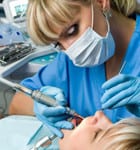 Most people in Leeds know how important it is to brush their teeth, but it can be extremely difficult to brush in-between the teeth and this can cause plaque to develop, increasing the risk of decay and gum disease. Inter-dental cleaning involves using specialist brushes to clean between the teeth and remove plaque from the cracks between the teeth.
Most people in Leeds know how important it is to brush their teeth, but it can be extremely difficult to brush in-between the teeth and this can cause plaque to develop, increasing the risk of decay and gum disease. Inter-dental cleaning involves using specialist brushes to clean between the teeth and remove plaque from the cracks between the teeth.
Methods of inter-dental cleaning
There are two main methods of cleaning between the teeth; these are:
- flossing
- inter-dental brushing
Flossing
Flossing involves passing dental floss (specialist flavoured tape), between the teeth and along the gum line. Dental floss helps to remove plaque and food deposits from between the teeth and is an effective way of reducing the risk of oral diseases.
Inter-dental brushing
Inter-dental brushing involves using specially designed brushes to clean between the teeth. Inter-dental brushes are available in different sizes and most are colour-coded to distinguish between the sizes. Inter-dental brushes remove plaque from between the gum but they do not target the gum line. If you have any questions about inter-dental brushing or you want to find out more, we will be more than happy to offer you information and advice.













